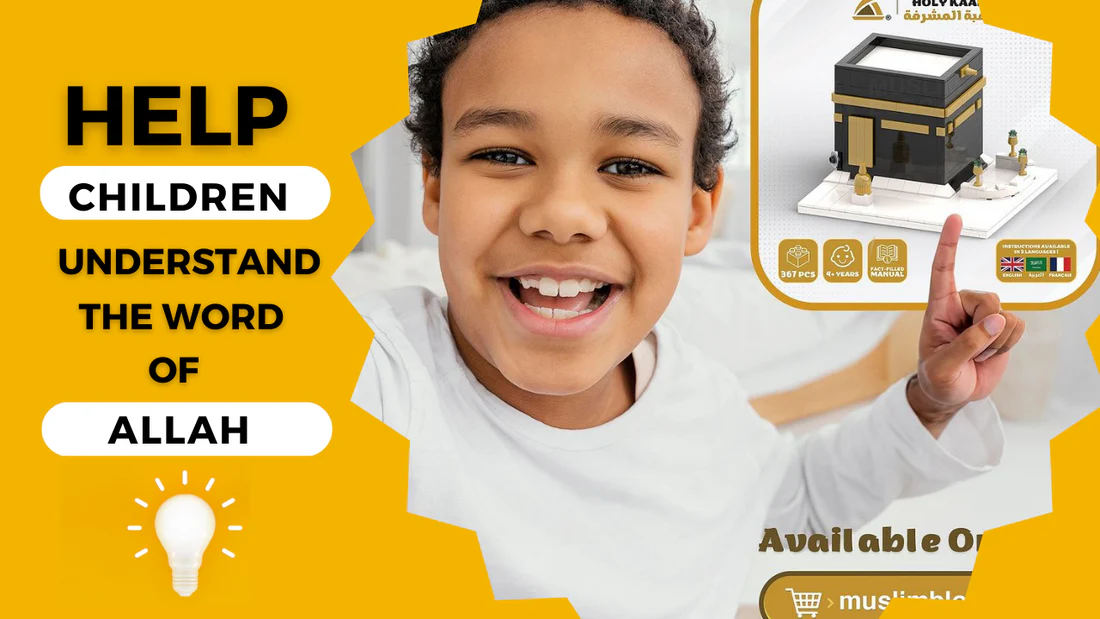“Learning the Quran is very important and must begin from childhood”…
Introduction
This is a phrase that you have undoubtedly heard several times around you… Indeed, it is obvious: yes, our children must learn the Koran, memorize it, revise it regularly and progress continuously over the months and years. And to achieve this objective, various solutions are available to us such as online courses or at the mosque.
But what about understanding the Quran? What solutions and tips can be put in place to help him understand what he is reciting? We’ll answer you below!
The Quran: a relationship to be formed from childhood
The Quran, Word of Allah revealed to the last of His Prophets and Messengers, Muhammad ﷺ, is the unaltered Book containing all the good to achieve success in this world and in the hereafter and warning against evil and bad works.
It helps every Muslim to distinguish good from evil and to know what are the pious works that allow you to obtain Allah’s approval and what are the actions that arouse His anger. It therefore constitutes a true guide, whose primary message is the call to Tawhid, authentic belief, purified of all polytheism.
Knowing this, we easily understand the importance of transmitting to our children the love for the Quran and supporting them in memorizing it.
Moreover, on this subject, the author ‘Abd As-Salâm Ibn ‘Abd Allah As-Soulaymân explains in his book The Education of Children in the Light of the Quran and the Sunnah:
“Learning the Noble Quran plays an important role in the education of children. If we wish goodness and a high rank for our children in this world and the Hereafter, we must ensure that we teach them the Book of Allah: reading, memorizing, meditating and putting it into practice, especially from 7 to 14 years, which is the best period to learn by heart. »
So, as explained in the extract above, reading and memorizing are important but they are not the only objectives to achieve. Indeed, meditation and putting it into practice should not be neglected.
And for this, one step is essential: access to understanding, understanding what we recite among the verses of Allah, Lord of the worlds.
Understanding the Quran: a door to meditation and practice
And these are precisely the two reasons why it is important to understand the verses that we recite, whether we are adults or children: to be able to meditate and to put them into practice.
The author ‘Abd As-Salâm Ibn ‘Abd Allah As-Soulaymân also explains in the same work:
“The ancients took care not only to learn the Koran but to understand it and put it into practice, which is the main thing. The behavior of the Prophet ﷺ reflected the teachings of the Quran, as ‘Aisha, may Allah be pleased with her, informs us. The merits of teaching the Quran that the Prophet ﷺ shared with us are a way of encouraging fathers to guide their children in this direction.
Moreover, Allah ‘azza wa jal informed us that He revealed this Quran so that it could be read and meditated on. He says, in the translation of the meaning of the verse:
Now that the importance of understanding has been highlighted, let’s see what tools are available to you, as parents, to help your children understand the Word of Allah… And regarding this, there are some tips you should know and solutions to help your child understand the Quran, there are plenty! Yes Yes !
Indeed, many authors and specialists in Islam have spoken on this subject and given us many beneficial advice.
Here are some of these tips accompanied by concrete tips that are easy to implement on a daily basis.
5 tips to make the Quran easier to understand
1st tip: Tell the stories cited in the suras and explain the context of their revelation
If you look closely, you will see that many small surahs contain easily accessible stories that will capture your child’s attention. Here are some examples:
– The story of the elephant who refused to advance to enter the territory of Mecca and destroy the Ka’aba in Surah Al-Fîl,
– The commercial voyages of the Quraysh in the surah of the same name,
– The capture of Mecca by the Muslims during the 8th year of the Hegira cited in Surah An-Nasr,
– The bad behavior of the uncle of the Prophet ﷺ, Abou Lahab, and his wife Umm Jamîl cited in surah Al Masad…
And the examples are still numerous! For each of them, you can, as a parent, sit down in front of your child and tell them these magnificent stories which will not fail to impress them in sha Allah but also to give meaning to the verses he is memorizing. And this, whether it is told in English or Arabic!
2nd tip: The principle of questions and answers
In her book I educate my child, Umm ‘Abd Ar-Rahman Al-Athariya explains:
“The Prophet ﷺ used to ask questions to the Companions in order to arouse their interest, to stimulate their intelligence. His exhortation was effective because it was persuasive and reasoned. »
Indeed, asking your child questions in order to arouse their interest in a surah is one of the effective ways to capture their attention and support them in their learning. These questions can arise at different times when learning a surah:
– Before memorizing a new surah
For example, before learning Surah Al-‘Alaq, it is possible to ask your child: “do you know which are the very first verses that were revealed to the Prophet ﷺ? Do you know who revealed them? Do you know the name of the angel who served as intermediary? » So many questions that will arouse keen interest in the child, in sha Allah.
– While memorizing a surah
For example, while learning the 4th verse of Surah Al Masad, you can ask your child: “do you know what the name of this woman who is mentioned was? Abou Lahab’s wife? » In this way, his learning will make sense, he will know who or what each verse he is reciting is talking about.
– After memorization
Here, it will be more of a summative evaluation, allowing the parent to ensure that the child has understood the memorized surah. Regarding Surah Al Fâtihah for example, the parent can ask the child: “how many verses does it contain?” Who are those who have incurred the wrath of Allah as it is said in the surah? Who are the lost? What is the Day of Retribution? »
Asking your child questions will arouse their interest even before starting to learn the surah but will also allow the parent to ensure that they have understood the meaning of it, once memorized.
3rd tip: The importance of reminders and revisions
To anchor your child’s knowledge and ensure that their understanding of the surahs does not disappear over time, it is strongly recommended to organize a few review sessions from time to time.
For this, different tips can easily be implemented. Here are a few :
– Explain the meaning of a short surah to your youngest child, making sure that the older child listens, which will allow him to refresh his knowledge.
– Organize competitions or contests between brothers and sisters by asking questions about the meaning of the surahs. Here are some examples of simple questions to ask them: “In which surah do we talk about Abu Lahab? In which surah is the Name of Allah “As-Samad” cited? In which surah does Allah speak about the Basin that will be offered to His Prophet ﷺ on the Day of Judgment? In which surah does Allah tell us that one day the Earth will shake violently? »
– With a few sheets of paper, a pen and a reliable book such as a Tafsîr, it is possible to make question cards, a paper casserole with questions inside or even a multiple choice questionnaire (MCQ) in order to to launch a competition between your children! A way to keep an eye on their learning and their understanding of the Word of Allah, while having fun.
4th tip: Expand the child’s Arabic lexicon
The Quran having been revealed in the Arabic language, it is important to give it all the space it deserves. Indeed, it constitutes the key to accessing a better understanding of the Word of Allah and thus, better meditate and put into practice the orders put forward there, while moving away from the prohibitions.
To help your child progress in the Arabic language and expand their lexicon, you have several options and among them: maintaining a bilingual repertoire. Here is a three-step action plan to create a simple, clear and easy-to-use directory.
– For a English-Arabic directory, buy a commercially available classic directory accompanied by the letters of the English alphabet. For an Arabic-English directory, purchase an Arabic-speaking directory, containing the letters of the Arabic alphabet.
– For each surah learned, select 3 or 4 important words to understand, memorize and write in English and Arabic. Example: for Surah Al Fajr, the following words can be entered in the repertoire: dawn – الفجر, people of ‘Âd – عاد, Pharaoh – فِرْعَوْن, man – الإنْسَانُ, etc.
– Finally, the child will regularly consult his repertoire, keep it up to date and review the different words he has entered inside it. A way to acquire Arabic vocabulary and make your child responsible for their learning.
5th tip: Choose your media wisely
To help your child understand what he is reciting from the Quran, it is also important to gather the appropriate supports that will be favorable to him.
– 1st support:
First of all, there is obviously the Tafsîr, the explanation of the meaning of the suras accompanied by comments from scholars of the Koran and the Sunnah.
Among the best-known exegetes and scholars in this field, we can cite:
- Ibn Kathir
- Sheikh As-Sa’di
- Sheikh At-Tabari
- Sheikh Ach-Chawkânî
- Sheikh Al-Qurtubi.
All these scholars, and many others, have devoted their energy and knowledge to offering the Muslim community a set of commentaries and explanations illuminating the meanings of the Holy Quran.
Abridged versions translated into English also exist commercially, such as the Tafsîr de Jouz ‘Amma by Cheikh As-Sa’di or the Authentic Exegesis of Ibn Kathîr. The parent can read these versions and explain them to their child to access the meanings of the Noble Quran.
– 2nd support:
Another particularly effective idea: offering your child age-appropriate materials to enable them to learn independently.
Books, manuals, applications, notebooks, audio CDs… The possibilities are diverse and have the advantage of pleasing children. Among these supports, there is of course the online learning platform Kataba Kidz, a platform 100% designed for our children, offering an entire section entitled “Around the Quran” and devoted to explaining the meaning of the short suras.
These audio books are also accompanied by glossaries, vocabulary words, mind maps, diagrams and quizzes, helping the child to master the essential notions of the surahs studied.


